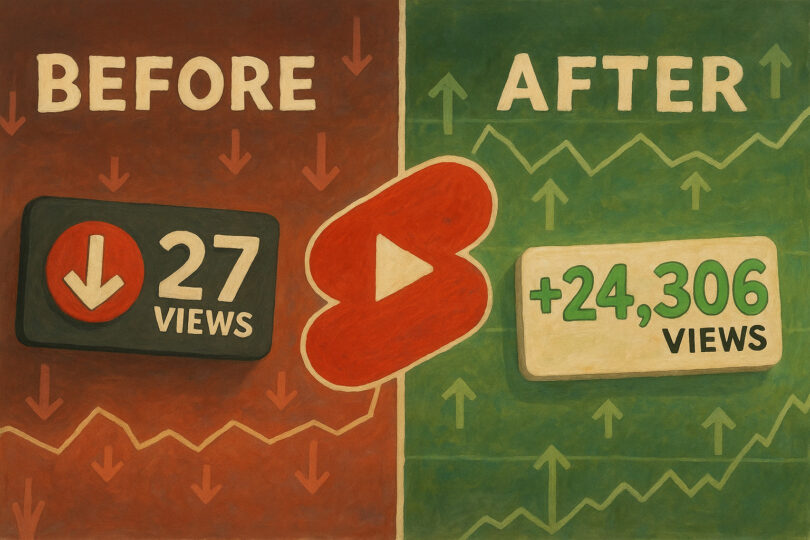What if you could unlock a formula that makes your YouTube Shorts go viral every single time ? Imagine waking up to hundreds of thousands — or even millions — of views on your latest upload. Sounds like a dream, right? Well, it’s not. There is a science behind virality, and once you master the structure, storytelling, and strategy behind high-performing Shorts, consistent success becomes inevitable.
This article reveals the exact methods used by top creators to blow up their Shorts from day one. Whether you’re just starting out or struggling to break past 100 views, this guide will give you the tools you need to craft engaging, algorithm-friendly content that keeps audiences watching, liking, and sharing.
By the end of this post, you’ll understand:
- Why most creators fail at making viral Shorts (and how to avoid those mistakes)
- The secret structure behind every successful Short
- How to hook viewers in the first 5 seconds
- The editing and pacing techniques that keep people watching
- The best times to post for maximum reach
- And much more!
Let’s dive in.
Understanding the Algorithm: Why Some Shorts Go Viral While Others Don’t
Before we jump into the tactics, it’s crucial to understand what actually drives visibility on YouTube Shorts. Contrary to popular belief, going viral isn’t about luck — it’s about mastering the platform’s algorithm.
The YouTube Shorts algorithm prioritizes engagement and watch time above all else. In simple terms, if your video grabs attention quickly and keeps people watching until the end, the algorithm rewards you with more visibility.
So, what does that mean for you as a creator?
It means your goal is not just to make good content — it’s to make irresistibly engaging content that hooks, entertains, and delivers value within the first few seconds.
Let’s explore how you can build that kind of content using a powerful framework known as HPC — Hook, Progression, Climax.
The HPC Framework: Your Blueprint for Viral YouTube Shorts
One of the most effective ways to structure your Shorts for maximum impact is the HPC method — short for Hook , Progression , and Climax . This storytelling model is used by some of the fastest-growing creators on the platform and ensures that your audience stays engaged from start to finish.
Let’s break down each part of the HPC framework and show you how to apply it to your own Shorts.
🎯 H – Hook: Capture Attention in the First 5 Seconds
Your hook is arguably the most important part of your entire video. It determines whether someone scrolls away or keeps watching. On average, users spend less than 2 seconds deciding whether to stay on a Short — so you only have a small window to grab their attention.
Here’s how to craft an irresistible hook:
- Start with action : Show something happening immediately.
- Use quick cuts : Keep the pace fast to maintain momentum.
- Ask a question : Curiosity is a powerful driver.
- Create mystery or suspense : Leave them wanting more.
- Add captions : Many viewers watch without sound, so text helps communicate your message clearly.
Example:
“I want to be the first person to have a snowball fight in the desert.”
This hook introduces the idea instantly, creates intrigue, and sets up a promise that the rest of the video must fulfill.
🔁 P – Progression: Build Anticipation and Deliver on the Promise
Once you’ve hooked your audience, the next step is to progress the story . This is where you deliver on the promise made in the hook while keeping the viewer engaged through pacing, visuals, and storytelling.
Key elements of strong progression include:
- Maintaining a clear narrative thread
- Using transitions between scenes
- Adding visual variety (e.g., different angles, B-roll)
- Including humor, drama, or emotion
- Avoiding long pauses or boring moments
You should also ensure that the progression leads logically toward the climax — don’t leave your audience hanging or confuse them with unrelated content.
Pro Tip:
If your hook promises a “snowball fight in the desert,” your progression should show the journey to get there — battling heat, finding snow, traveling back — before delivering the payoff.
🌟 C – Climax: Deliver the Payoff and End Strong
The climax is the moment your audience has been waiting for — the resolution to the hook. This is where you deliver the punchline, reveal the trick, or showcase the big finale.
To maximize impact:
- Make it satisfying : Give the viewer exactly what they came for.
- Keep it brief but memorable : Don’t drag it out unnecessarily.
- End with a call-to-action : Encourage likes, comments, or follows.
In the example mentioned earlier, the climax is the actual snowball fight — the fulfillment of the initial promise. It’s short, sweet, and highly shareable.
Content Creation Tips That Guarantee Better Engagement
Now that you understand the basic structure of a viral Short, let’s dive into the practical steps you can take to improve your content creation process.
🧠 Step 1: Research Your Audience and Niche
Before creating any Short, ask yourself:
- Who am I targeting?
- What do they care about?
- What types of videos are already performing well in my niche?
Study top creators in your space. Analyze what works — not just the topics, but the tone , pacing , and editing style . You don’t need to copy them outright, but understanding what resonates with your target audience is key.
For example, if you’re targeting younger viewers, use energetic music, fast cuts, and on-screen text. If your audience is more mature, opt for a calmer tone with voiceover narration.
📝 Step 2: Brainstorm High-Potential Topics
Great ideas come from great research. Here’s how to brainstorm winning video concepts:
- Use tools like Tubular Labs , VidIQ , or Noxinfluencer to find trending topics.
- Look at your competitors’ most viewed Shorts.
- Repurpose evergreen content into new formats.
- Focus on solving problems or answering questions your audience has.
Remember: A compelling topic alone isn’t enough — how you execute it matters just as much.
🎥 Step 3: Master Editing and Storytelling
Even the best idea can fall flat if the execution is poor. To stand out, focus on both technical skills (editing, transitions, effects) and creative storytelling .
Here’s how to level up your editing game:
- Use quick cuts to maintain energy.
- Add captions for silent viewers.
- Match music to mood — upbeat tracks for excitement, slow melodies for emotional moments.
- Include visual variety — switch camera angles, zoom in/out, add overlays.
- Keep it concise — aim for 30–60 seconds max.
And don’t forget about story structure . Even short-form content needs a beginning, middle, and end. Use the HPC framework to ensure clarity and flow.
⏰ Step 4: Post at the Right Time for Maximum Reach
Timing plays a huge role in the success of your Shorts. Posting when your audience is online increases the chances of early engagement, which signals to the algorithm that your content is worth promoting.
To find the best time to post:
- Open YouTube Studio
- Go to the Audience tab
- Scroll down to the “When your viewers watch” graph
This chart shows you when your audience is most active. For many creators, mornings tend to be the most popular posting time — but it varies depending on your niche and location.
Don’t rely on guesswork — always check your analytics to determine your optimal posting schedule.
🔄 Step 5: Find the Ideal Upload Frequency
Consistency is key to building traction with Shorts. But how often should you post?
From real-world testing across multiple channels, here’s what we found:
| Upload Frequency | Pros | Cons |
|---|---|---|
| Once per day | Keeps channel fresh, builds consistency | Requires high-quality output daily |
| 3–4 times per week | Balanced approach, allows for quality control | May miss opportunities for growth |
| Twice per week | Easier to manage, still maintains presence | Less frequent exposure |
| Multiple times per day | High visibility potential | Quality often suffers |
Based on these results, posting once per day seems to be the sweet spot — it gives you enough time to create polished content while maintaining consistent visibility.
However, the most important thing is to stay consistent . Choose a frequency you can sustain and stick with it.
Common Mistakes That Kill Engagement (And How to Fix Them)
Even with the best intentions, many creators unknowingly sabotage their Shorts with common mistakes. Here are a few pitfalls to avoid:
❌ Rushing the Payoff
As seen in one example from our source material, revealing the core idea too early kills anticipation. Always save the main point for the end — especially if it’s a joke, trick, or life hack.
❌ Ignoring Visual Variety
Using the same shot over and over gets boring fast. Spice things up with cutaways, B-roll, animations, or text overlays to keep viewers visually engaged.
❌ Overloading With Text
While captions are essential, too many words on screen can overwhelm viewers. Use short, punchy phrases that highlight key points without cluttering the frame.
❌ Skipping the Call-to-Action
Always end with a prompt encouraging viewers to engage — whether it’s liking, commenting, or subscribing. Without a CTA, you miss out on valuable interaction that boosts your Shorts in the feed.
Tools and Resources to Supercharge Your Shorts Game
Want to level up your production quality without spending hours learning complex software? These tools can help:
🎬 Video Editing Tools
- CapCut – Free, mobile-friendly editor with templates and effects
- KineMaster – Great for advanced editing on mobile
- Adobe Premiere Rush – Professional-grade editing for desktop and mobile
- Canva – Perfect for designing thumbnails and on-screen graphics
🔍 Analytics & SEO Tools
- YouTube Studio – Built-in analytics for tracking performance
- VidIQ – Keyword research and competitor analysis
- TubeBuddy – Browser extension for optimizing metadata
- SocialBlade – Compare your growth against other creators
📱 Mobile Optimization
Since most Shorts are watched on phones, always preview your videos on a mobile device before publishing. Check for:
- Clear text readability
- Proper framing
- Audio clarity
- Smooth transitions
Final Thoughts: Consistency + Strategy = Viral Success
Creating viral YouTube Shorts isn’t magic — it’s a combination of strategy , execution , and consistency . By following the HPC framework, focusing on your audience, and refining your editing and storytelling skills, you can dramatically increase your chances of going viral.
But remember: Rome wasn’t built in a day. Growth takes time, experimentation, and resilience. Keep analyzing your performance, tweaking your approach, and learning from top creators.
With dedication and the right blueprint, your Shorts can go viral — not just once, but every time.
Frequently Asked Questions (FAQs)
Q: How long should a YouTube Short be?
A: Ideally between 15–60 seconds. Shorter videos often perform better due to higher retention rates.
Q: Can I reuse content from my regular YouTube videos in Shorts?
A: Absolutely! Repurpose your best clips, behind-the-scenes footage, or bloopers into Shorts for extra reach.
Q: Do hashtags matter for YouTube Shorts?
A: They help, but aren’t as crucial as on platforms like Instagram. Focus more on content quality and timing.
Q: Should I use voiceovers or text in my Shorts?
A: A mix of both works best. Use text for silent viewers and voiceovers for emotional depth.
Q: How do I track the performance of my Shorts?
A: Use YouTube Studio’s Analytics tab to monitor views, watch time, and audience retention.
Summary Table: Key Takeaways for Making Viral YouTube Shorts
| Element | Description |
|---|---|
| HPC Framework | Hook → Progression → Climax |
| Hook | Must grab attention in 5 seconds |
| Progression | Build anticipation, deliver on the hook |
| Climax | Provide satisfying payoff |
| Editing Tips | Fast cuts, captions, varied visuals |
| Posting Time | Based on audience activity (check analytics) |
| Upload Frequency | Once per day is ideal for most |
| Tools | CapCut, KineMaster, VidIQ, TubeBuddy |
| Mistakes to Avoid | Rushing payoff, boring visuals, no CTA |
Ready to Start Creating Viral Shorts?
Now that you have the ultimate blueprint, it’s time to put it into practice. Start experimenting with different hooks, structures, and editing styles. Track your performance, learn from your wins and losses, and refine your process.
And remember — every viral Short starts with one click of the record button.
Stay consistent. Stay creative. And most importantly — never stop learning.








Leave a Comment